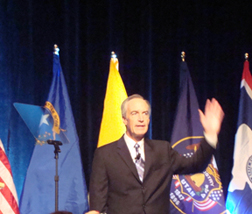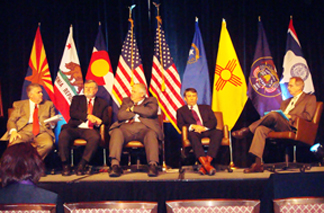Colorado River: Changing the Watermaster
Change in troubled times
LeRoy W. Hooton, Jr.
January 6, 2009
Las Vegas NV). At the Colorado River Water Users Association Annual meeting held at Caesars Palace during December 15-17, the attendees witnessed the end of an era and wondered about the beginning of another. With the election of a new president in November, the old administration said good-bye, leaving the water users to speculate about President-elect Obama's views regarding water policy on the Colorado River. Not everything is great these days. Besides the vexing national economy, the Colorado Basin is still experiencing drought conditions – not to mention the myriad of other troublesome issues affecting the lifeblood of the Southwest U.S.
The position of Secretary of Interior has a special relationship with the water users, acting as the watermaster over the administration of the Colorado River System. During the past 8 years, Republican President Bush has
|
Secretary Dirk Kempthorne, using sport metaphors spoke about getting the football into the end zone last year when the Record of Decision implementing the Seven-State River Shortage agreement was signed, which is touted as second in importance only to the original 1922 Colorado River Compact. The agreement established new operational rules for the coordinated operations of Lake Powell and Lake Mead, with guidelines for dealing with shortages and surpluses. The agreement also established new initiatives for water conservation on the river, including developing additional water supplies. Kempthorne also spoke of the groundbreaking ceremony for the Drop 2 Reservoir and him personally turning the valve to release water for the high flow test of the Glen Canyon Dam. And last December, signing the Arizona Water Rights Settlement agreement, and recently completion of the Animas-La Plata Project in Colorado. Furthermore, he spoke about work yet to be completed, including resolving the issues relative to the 1944 Mexico Treaty, the Adaptive Management Program for Glen Canyon Dam and Indian Water Rights. He urged follow up on the 2007 Climate Change Task Force report and further research.
He reiterated his belief that negotiations rather than litigation better serves the water users, encouraging continued cooperation and inclusion of all of the stakeholders in managing the river. “ We need to move forward together in the 21st century as neighbors and partners,” said Secretary Kempthorne.
A look into the future was included with a panel discussion entitled “Transition of Power,” moderated by Washington County Water Conservancy District general manager Ron Thompson. The panel consisted of Marcus G. Faust, Guy Martin, Bennett Raley and J. Tom Ray. The panelist agreed that Ken Salazar was the best person for the job of those under consideration. His background in water was deemed to be a positive attribute in this time of change and challenge.
President-elect Obama ran his campaign on change, which according to the panel will permeate into all facets of the new administration, including Interior. This paradigm will especially apply to climate change, energy policies and the reduction of greenhouse gas emissions. “This administration is obviously fully acceptive with climate change and what needs to be done,” said panelist Guy Martin. Accordingly, there is a good chance that the new under Secretary or Assistant for Water will be someone well versed in climate change. This change in policy will have a direct impact on the Colorado River. There is a nexus between water and energy that will require new ways of thinking said Marcus Faust. He related that several weeks ago Congressman George Miller (D-California) gave a speech in Salt Lake City where he said that there is a need for the Bureau of Reclamation to change its heart and mind regarding climate change. Faust said this will impact everyone on the river.
|
As stated by Bennett, new administrations have unexpected issues to deal with when taking office. The overarching issue now is the nation's economy, which may redirect the administration's focus in the beginning.

